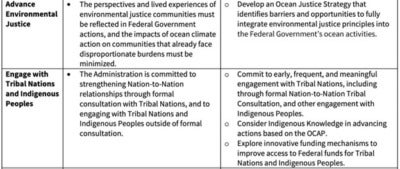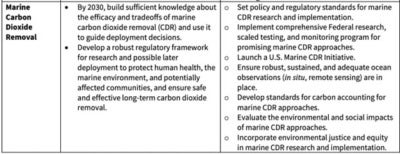The United States is an ocean nation–the country has jurisdiction over the second largest area of ocean territory which covers more surface area than the U.S.’s land mass–and yet typically climate conversations and subsequent policy decisions have excluded our 4.4 million square miles of ocean space. This historic omission of the ocean is particularly remarkable given that it is significantly impacted by climate change through ocean warming, acidification, and sea level rise, while simultaneously functioning as a primary regulator of climate and weather patterns. This means, we have all but ignored our maritime domain as a critical source of climate solutions.
The tides are changing, however, with the Biden-Harris Administration joining a growing movement to address this oversight through the release of its long-awaited Ocean-Climate Action Plan (OCAP) last month. For the first time, the full force of the federal government has positioned itself to categorically ensure society takes full advantage of the ocean as a key source in mitigating climate change and that the ocean and ocean-based communities are resilient to climate impacts.
OCAP represents a whole of government approach with concrete actions and timeframes for investing in ocean-climate opportunities and federal agencies are prepared to begin implementation, but the plan also calls on the broader community, including bipartisan public, state, territorial, and tribal expertise support to mobilize and collaborate around its actions and goals.
The Aspen Institute Energy and Environment program (EEP), for over 50 years, has leveraged its distinct convening power to foster inclusive, nonpartisan dialogue and has long charged itself with this same call for bipartisan collaboration in pursuit of climate goals. Much of our team’s work already aligns with OCAP’s specific calls to actions, as outlined below, and in driving these ocean-climate solutions, we will also prioritize our key role in widening this net of ocean actors.
Recognizing the interlinkages of many ocean-climate opportunities, the OCAP also lists several cross-cutting principles, two of which underline the fundamental imperative to center environmental justice and engage with “Tribal Nations, Indigenous Peoples, and communities” in ocean-climate discussions and action. Such coordination is also an EEP programmatic commitment that is embedded across our worksteams, including amplifying Indigenous voices across our platforms. Most recently at our nearly 3,000-person Aspen Ideas: Climate event in Miami Beach, Florida, the programming centered dialogues around community engagement and equity, bringing new and diverse perspectives to those conversations, and developing a broader portfolio of ocean-climate discussions into which we can incorporate our values. The OCAP provides a useful framework for our team and other organizations to consider as we build out our existing and new projects.

Source: Ocean Climate Action Plan
Of the specific ocean-climate actions outlined in the OCAP as priorities for this Administration, our team is addressing the decarbonization of the maritime shipping sector as a way to reduce emissions released into the atmosphere and ocean carbon dioxide removal (ocean CDR), which uses the power of the ocean to capture and durably store atmospheric carbon dioxide.
In the OCAP, the Biden-Haris Administration builds on its existing leadership in the maritime decarbonization space, previously punctuated by the U.S.’s support of a zero-emission goal for the maritime sector by 2050 and the launch of the Green Shipping Challenge at COP27 in Sharm El Sheikh, Egypt. Of particular relevance to the work the Aspen Shipping Decarbonization Initiative (Aspen SDI) is doing convening multinational cargo owners to accelerate shipping decarbonization through the Cargo Owners for Zero Emission Vessels (coZEV) and the Zero Emission Maritime Buyers Alliance (ZEMBA) is the OCAP action focused on “incentiviz[ing] and enabl[ing] the shipping industry to adopt zero-emission fuels and technologies.”
First mover action through coZEV and ZEMBA is essential to accelerate maritime shipping decarbonization, but first movers can’t do it alone. Climate-leading cargo owner action must be met by equally ambitious policy support to drive innovation, support first movers, incentivize laggards, and ensure elements of justice and equity are incorporated into the transition. Federal action through the OCAP could help ensure the successful alignment of the maritime sector with a zero-emission trajectory.


Source: Ocean Climate Action Plan
In an effort to expand upon the ocean’s role as a carbon sink, the OCAP also calls for advancing marine carbon dioxide removal, an effort which our team has worked on through its own Ocean CDR project. Recognizing that the ocean is already a major sink for excess carbon dioxide emissions and that an emerging industry seeks to accelerate this process using various methodologies, we produced a report in December 2021 outlining Guidance for Ocean-Based Carbon Dioxide Removal Projects.
In our next phase of this project, we are engaged with global experts in governance, social and community engagement, environmental externalities, and scientific monitoring, reporting, and verification to create a comprehensive Code of Conduct for researchers and practitioners of early-stage ocean CDR projects. Our intention in this work is to balance the need to accelerate drawdown of excess atmospheric CO2 and the broader societal imperative to not overburden our ocean ecosystems and cause unintended outcomes and consequences.

Source: Ocean Climate Action Plan
The Biden-Harris Administration’s Ocean Climate Action Plan represents a major step toward fully taking advantage of the power of the ocean and coasts to approach and respond to climate change. Our team will continue advancing its existing work around maritime shipping, ocean CDR, Indigenous engagement, and advancing environmental justice conversations in line with OCAP’s priorities, as well as collaborating and exploring new project areas with an ever-expanding network of ocean partners. And crucially our program will advance these projects in a way that builds bipartisan collaboration and mobilizes the full spectrum of actors that OCAP calls on to implement this ambitious plan. Congressional leadership, engagement, and appropriations, as well as innovation and creativity, will be key to ensure the full successful implementation of the actions in the OCAP, and our team is prepared to heed the Administration’s call in bringing the ocean community together, and finally in earnest, into climate conversations.
Contributors to the blog include Kathryn Benz, Ingrid Irigoyen, Greg Gershuny.

